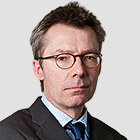A potential roadblock to talks between Iran and the US on the future of the nuclear deal has been cleared after the UN nuclear inspectorate said it had won Iran’s agreement to return to Tehran to hold focused talks on doubts over the veracity of the country’s previous declarations about its nuclear sites.
Rafael Grossi, the director general of the UN’s International Atomic Energy Agency, said Iran and IAEA inspectors had been talking past each other, with Iran failing to provide credible answers to the inspectorate’s questions. He said he had decided “we either continue with this merry-go-round or try something else”.
He said Iran had now agreed to take part in direct, focused technical meetings at the beginning of April, with the aim for inspectors to report back to an IAEA board meeting in June.
The agreement reached over the past 48 hours means European countries will not go ahead with plans to table a censure motion against Iran at an IAEA board meeting on Friday.
In July 2015, Iran and a six-nation negotiating group reached a landmark agreement known as the Joint Comprehensive Plan of Action that ended a 12-year deadlock over Tehran’s nuclear programme. The deal, struck in Vienna after nearly two years of intensive talks, limited the Iranian programme, to reassure the rest of the world that it cannot develop nuclear weapons, in return for sanctions relief.
At its core, the JCPOA is a straightforward bargain: Iran’s acceptance of strict limits on its nuclear programme in return for an escape from the sanctions that grew up around its economy over a decade prior to the accord. Under the deal, Iran unplugged two-thirds of its centrifuges, shipped out 98% of its enriched uranium and filled its plutonium production reactor with concrete. Tehran also accepted extensive monitoring by the International Atomic Energy Agency (IAEA), which has verified 10 times since the agreement, and as recently as February, that Tehran has complied with its terms. In return, all nuclear-related sanctions were lifted in January 2016, reconnecting Iran to global markets.
The six major powers involved in the nuclear talks with Iran were in a group known as the P5+1: the UN security council’s five permanent members – China, France, Russia, the UK and the US – and Germany. The nuclear deal is also enshrined in a UN security council resolution that incorporated it into international law. The 15 members of the council at the time unanimously endorsed the agreement.
On 8 May 2018, US president Donald Trump pulled his country out of the deal. Iran announced its partial withdrawal from the nuclear deal a year later. Trump's successor, Joe Biden, has said that the US could return to the deal if Iran fulfilled its obligations.
Saeed Kamali Dehghan, Iran correspondent
Iran had said it would in effect end its cooperation with the IAEA if the motion went ahead, which would have damaged hopes of starting informal talks between Iran and the US over how both sides could come back into compliance with the deal.
The French president, Emmanuel Macron, had warned his Iranian counterpart, Hassan Rouhani, that the chances of reviving the nuclear deal would collapse without a clear gesture from Iran.
In response to Iran’s offer to clarify its disclosures, Europe said it would hold off on its censure motion to give time for diplomacy.
Iran has said it will not hold talks with the US if sanctions remain in place, and the US says it will not hold talks until Iran takes further steps to come back into compliance.
Iran’s foreign ministry spokesperson, Saeed Khatibzadeh, said: “Today’s developments can keep open the path of diplomacy initiated by Iran and the IAEA.”
The Iranian ambassador to the IAEA, Kazem Gharibabadi, tweeted that “due to extensive diplomatic consultations … a glimpse of hope is looming to prevent unnecessary tension”.
This week a report in the Iranian Vatan-e-Emrooz newspaper said Tehran had “temporarily suspended the production of uranium metal on the order of [Rouhani]”. The government in Tehran has not disputed the accuracy of the report.
The production of uranium metal goes against a 15-year ban in the nuclear deal on “producing or acquiring plutonium or uranium metals or their alloys”. Grossi said he had not been informed by Iran about anything related to uranium metal.
Iran says the uranium metal production is part of its plans to provide advanced fuel for a research reactor in Tehran.
Grossi did not go into details as to why he thought his new technical process would bring more credible responses than those provided so far, but he is clearly determined not to see the process abandoned prematurely.
Late last month Iran suspended some IAEA inspections as US sanctions had not yet been lifted, which was described by Grossi as a “huge loss” for the agency. However, after two days of talks between Grossi and Iranian officials in Tehran, a three-month arrangement was agreed under which Iran pledged to keep recordings “of some activities and monitoring equipment” and hand them over to the IAEA as and when US sanctions were lifted.
Grossi said the IAEA had a series of unanswered questions, but he did not go into the details. It has been previously reported that Iran may be drilling a uranium metal disc that experts say could be used to create material for a neutron initiator, a key component of a nuclear weapon. A second suspicion was that nuclear material had been introduced at a site where Iran may have tested high explosives that can be used to detonate a nuclear weapon.
The agency is also asking Iran about another undeclared site where illicit uranium conversion and processing may have taken place, it said.











